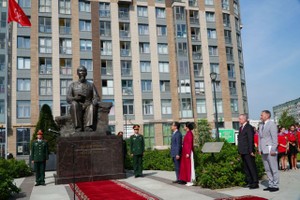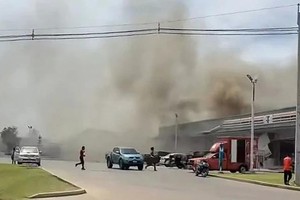PORT-AU-PRINCE (AFP) – Haitians arrived Friday on the first commercial flight into their country since last month's earthquake, desperately hoping to find family members alive and their homes still standing.

"I want to see my wife," said Jean Felix as he waited to board the plane before takeoff in Miami.
"She's living in the street and she's told me by phone that we lost everything... I'm going there with my heart broken."
The American Airlines plane touched down in Port-au-Prince to a warm welcome after leaving from Miami, but many passengers carried a heavy emotional load.
The flight came to a stop at the terminal with 132 passengers onboard. A pilot waved a Haitian flag from the cockpit window.
A band playing Creole music in the terminal greeted their arrival -- a common practice prior to the devastating quake -- but the passengers were bussed to a separate building to pass through immigration and customs controls because of damage to the airport.
Amid the small celebration, travelers were anxious to visit family members who survived and the graves of those who did not. Some wondered about how their own homes had fared in the disaster.
Marie Ange Levasseur, 45, began to cry as she spoke of how her cousin, who died in the quake, used to greet her at the airport when she would visit.
Levasseur now lives in Miami but still has family in Haiti.
"The first destination I want them to take me to is my cousin's grave," she said as she waited in line for immigration. "It's very sad, this trip. I've never had such a sad trip like that."
The capital's airport has been an aid lifeline for the devastated country in the wake of the January 12 earthquake that killed more than 217,000 people and left over a million homeless.
Officials said resuming commercial traffic would inject crucial revenue into Haiti's crippled government.
But for Haitians, it was simply a way of finding out who was still alive.
"I don't have news from my sons nor from my brothers," said Maurice Gernier, before boarding in Miami. "I don't know anything, nothing about anybody... I need to go and see what happened."
Jean Eddy Porche, 49, who also lives in Miami, arrived in Port-au-Prince with his wife to check on family members and the house he still owns here. He had been told it was damaged and was not sure whether it could be repaired.
Homes belonging to his mother and sister were completely destroyed.
"I have friends who are dead, cousins," said Porche, adding that he felt "completely traumatized" upon arrival.
Outside the Port-au-Prince airport, family members waited under the sun behind yellow caution tape for the passengers to emerge.
Some embraced as they saw each other, while others seemed weary and simply turned and walked down the street together.
Since the earthquake, the country's largest commercial airport has been transformed into a makeshift military base, with over a hundred armed forces and UN flights passing through each day when traffic was at its peak.
Thousands of tonnes of food and medical aid, along with disaster relief personnel have poured into Haiti via the hub, which at times has been overwhelmed, forcing officials to turn away some aircraft.
US embassy spokeswomen Elizabeth Detmeister said the resumption of commercial routes meant that US evacuation flights would now be phased out.
American Airlines will offer two flights a day from Miami and one from nearby Fort Lauderdale. A flight from New York's JFK International Airport will operate four times a week, the airline said.
From March 12, the airline's American Eagle service will launch a new daily route to Haiti from Puerto Rico, and two flights through Santo Domingo and Santiago in the neighboring Dominican Republic.
























